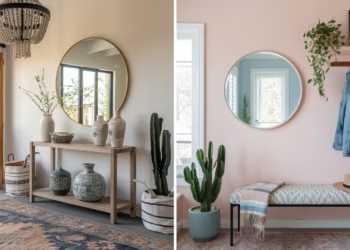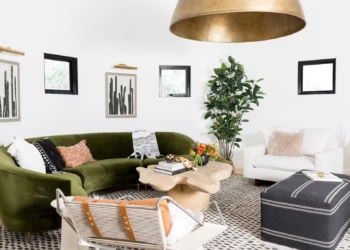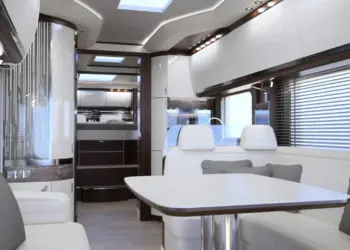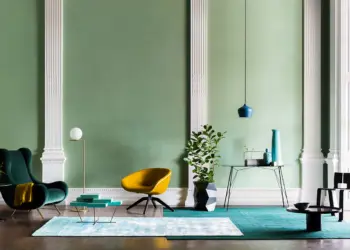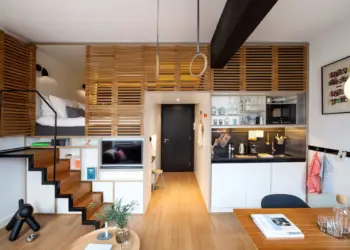In the realm of interior design, color reigns supreme as the artist’s medium, imbuing spaces with depth, vitality, and character. It serves as a transformative tool, capable of turning a mundane room into a vibrant sanctuary or a chaotic environment into an oasis of serenity. In this deep-dive, we embark on an intricate journey into the domain of color in interior design, unearthing its profound psychological impacts, practical applications, and the artistry of harmonizing a kaleidoscope of hues.
Table of Contents
The Psychology of Color
Understanding Color Psychology
Delving into the world of color psychology reveals a captivating dimension where the emotional and mental repercussions of colors on human behavior come to the forefront. Each hue wields the power to evoke diverse feelings and moods, painting a complex tapestry of human experiences. For instance, the warm embrace of reds and yellows can awaken energy and passion, while the tranquil blues and greens cast a soothing spell, bestowing a sense of calm and serenity upon the observer.
- The Duality of Warm and Cool Colors
The dynamic interplay between warm and cool colors orchestrates the visual symphony of interior design. Warm colors, with their fiery and inviting attributes, cocoon a room in coziness and warmth, extending a hearty welcome to its occupants. In stark contrast, cool colors weave a tapestry of tranquility, where serenity reigns supreme, making them the preferred choice for spaces dedicated to relaxation.
- The Subtle Mastery of Color on Mood
The meticulous selection of colors within your living quarters exerts a profound influence on the emotional landscape of your daily life. Picture yourself awakening in a sun-drenched bedroom, its walls adorned with a cheerful tapestry of sunny yellows. The very presence of this vibrant hue instantaneously elevates your spirits, casting a radiant glow upon your day. Conversely, a dimly lit and somber chamber may have the opposite effect, clouding your vigor and stifling your inspiration.
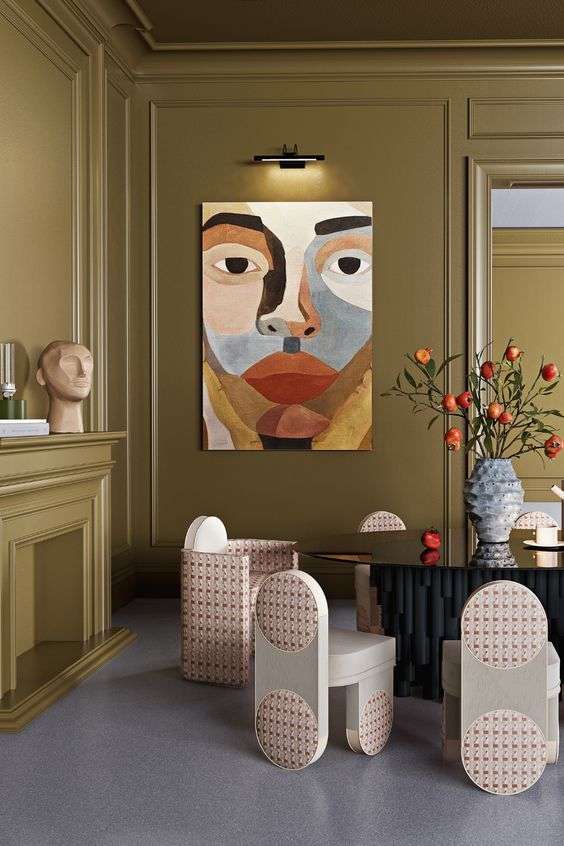
Embarking on the Color in Interior Design
Choosing the Right Color Scheme
The journey of interior design embarks upon the selection of the ideal color scheme, a pivotal step that serves as the foundation upon which the entire aesthetic narrative rests. Whether crafting the ambiance of a living room, bedroom, kitchen, bathroom, or dining area, the chosen color scheme dictates the architectural tenor of the space, setting the stage for the drama that is to unfold.
Monochromatic Elegance
The allure of a monochromatic color scheme lies in its harmonious simplicity. It revolves around the artful manipulation of variations of a solitary hue, weaving a tapestry of unity and sophistication. Envision a room swathed in shades of azure, ranging from ethereal aqua to the depths of navy; this monochromatic masterpiece bathes the room in serene cohesion.
Dancing with Complementary Contrasts
Complementary colors, positioned diametrically opposite each other on the color wheel, conspire to create breathtaking contrasts when united in a design symphony. Picture the magnetic interplay of blue and orange, or the fiery tango of red and green. When harnessed with finesse, this approach breathes vivacity and dynamism into a space, allowing it to unfurl its vibrant wings.
Triadic Symphonic Harmony
Triadic color schemes, characterized by the strategic selection of three hues equally spaced around the color wheel, herald a realm of dynamic diversity. Imagine the bold embrace of primary colors-red, blue, and yellow-each vying for attention in equal measure. This symphonic fusion bestows upon the space an eclectic vibrancy, captivating the observer’s gaze.
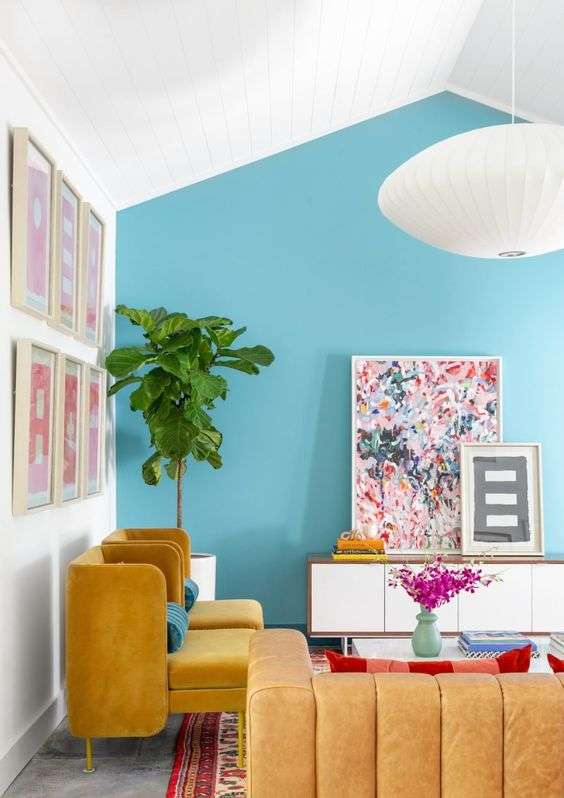
Color’s Varied Impact in Diverse Spaces
1. Color in Interior Design: Living Room Vibes
The living room, often hailed as the heart of the home, thrives on warm and inviting colors such as soothing beiges, gentle blues, or earthy greens, creating an intimate ambiance for familial gatherings. It is in these moments that the strategic addition of a vibrant accent, be it through plush pillows or captivating artwork, transforms the space into an inviting haven.
2. Color in Interior Design: Crafting Serenity in the Bedroom
The bedroom, a sanctuary for reprieve, necessitates a delicate equilibrium between tranquility and individualistic style. The tender embrace of soft pastels, understated grays, or muted purples sets the stage for rejuvenation, while the whimsy of a statement headboard or opulent bedding adds a personal touch to the sanctuary.
3. Color in Interior Design: Infusing Energy into the Kitchen
The kitchen, a bustling hub of culinary creativity, thrives on an energetic vibrancy. The bold infusion of colors like fiery reds, vibrant oranges, or sunny yellows awakens the senses and ignites the culinary spark. These shades stimulate the appetite and establish an inviting epicurean realm.
4. Color in Interior Design: Serenity in the Bathroom
Bathrooms, cocooned in tranquility, beckon with the soothing allure of light blues, aqua tones, or pale greens. These serene colors evoke a spa-like aura, with colorful tiles and vivid shower curtains serving as delightful accents that elevate the experience.
5. Color in Interior Design: The Allure of the Dining Room
Dining rooms extend an artistic canvas for bold design choices. Deep reds, regal purples, or sophisticated blacks establish an aura of elegance. Consider the drama of a colorful chandelier or the allure of captivating artwork, each contributing to a symphony of sophistication.
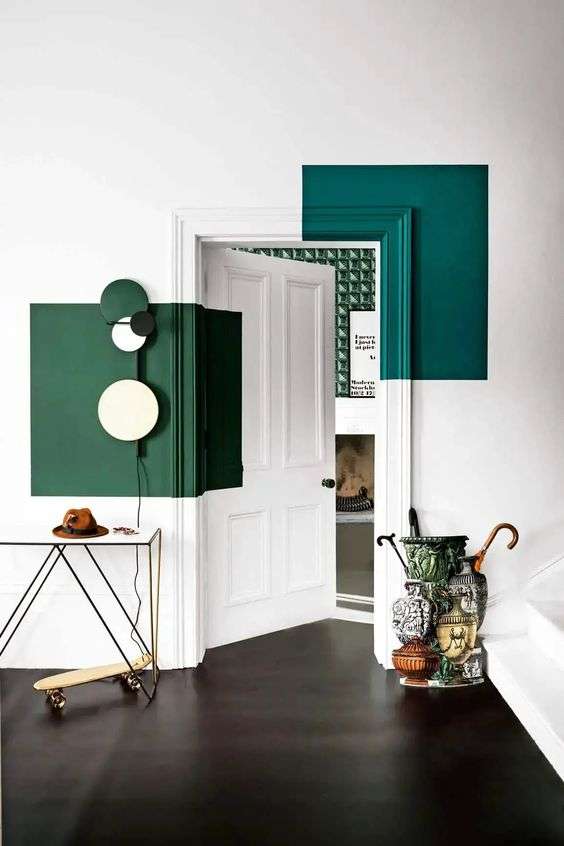
Unveiling the Artistry of Color through Design Elements
Adding Color Through Furniture and Decor
Furniture and decor, akin to artistic brushstrokes, infuse spaces with color, breathing life into the canvas. A vibrant sofa, colorful chairs, or an eye-catching coffee table stand as focal points, each weaving their unique narrative within the space. Harmony emerges not through color matching but through complementary or contrasting choices.
The Intrigue of Accent Walls
Accent walls, the showstoppers of interior design, inject a bold splash of color without overwhelming the entire stage. Through the medium of paint, wallpaper, or textured finishes, these architectural marvels come to life. The chosen hue, an integral part of the grand narrative, resonates with the overall design concept, providing depth and dimension.
Elegant Soft Furnishings
Soft furnishings, the gentle caress of decor, offer a versatile canvas for the expression of color. Throw pillows, area rugs, and curtains effortlessly metamorphose a room’s color palette, lending themselves to seasonal metamorphoses and trend experimentation.
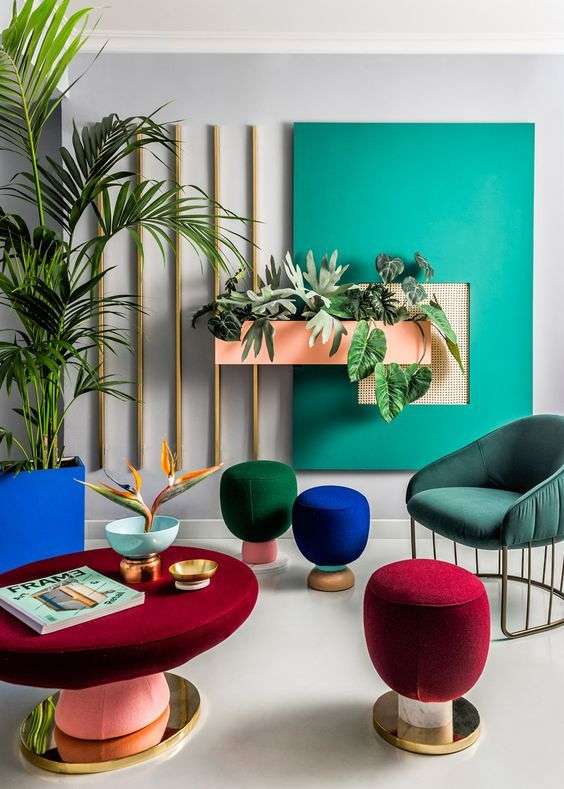
The Art of Balance
1. Color in Interior Design: Mastering Balance with Neutrals
Neutrals, the steady hand in the artistic endeavor, form a counterbalance to the vivid tapestry of color. Whites and grays, a canvas of purity and spaciousness, enhance the vibrancy of the room when judiciously intertwined with colorful accents.
2. Color in Interior Design: The Subdued Symphony of White and Gray
White, the eternal emblem of interior design, beckons with its promise of purity and expansiveness. Gray, a chameleon of shades, provides a neutral backdrop that harmoniously accommodates any color scheme, a testament to its versatility.
3. Color in Interior Design: Synchronizing with Earthy Tones
Earthy tones, warm browns, and verdant greens establish a deep-rooted connection with nature. These hues envelop a space with a cozy and inviting aura, evoking a sense of harmony with the natural world.
The Final Touches
1. Color in Interior Design: The Culminating Flourish With Accessories
Accessories, the pièce de résistance, bear the signature of the designer’s touch, bringing forth the final layer of personality and coherence. Colorful throw blankets, decorative cushions, and captivating artwork breathe life into the design, orchestrating a harmonious crescendo.
2. Color in Interior Design: Artistry Meets Color
Artwork, a maestro in its own right, commands attention as it introduces color and visual intrigue. The judicious selection of a single piece can chart the course for the entire color palette, steering the artistic narrative with aplomb.
3. Color in Interior Design: Embracing Nature’s Palette: Plants in Design
The presence of nature is not to be overlooked, for houseplants, with their lush greenery, bring more than just color-they bring life. They are living, breathing components of your design, offering an organic, chromatic accent to your canvas.
In the enchanting realm of interior design, color emerges as the silent raconteur, weaving stories, evoking emotions, and defining spaces. It stands as the versatile brush that allows homeowners to paint their unique canvases, whether they seek serenity, vitality, or elegance. So, embrace the transformative power of color and allow your home to tell its vibrant, chromatic tale.
FAQs
What are the foundational principles of employing color in interior design?
The core principles encompass understanding color psychology, selecting an appropriate color scheme, and achieving equilibrium with neutrals.
How can I choose the ideal color scheme for my space?
Consider the room’s intended purpose, the desired emotional atmosphere, and your personal preferences. Experiment with monochromatic, complementary, or triadic schemes.
What are some creative methods to introduce pops of color into a neutral room?
Utilize vibrant furniture pieces, incorporate accent walls, and employ soft furnishings such as cushions, rugs, and curtains to infuse color into neutral spaces.
Are there any prevailing color trends in contemporary interior design?
Current trends lean towards earthy tones, warm neutrals, and bold color accents as focal points.
Can I incorporate dark colors in smaller spaces without making them feel cramped?
Yes, dark colors can be integrated into smaller spaces effectively. Pair them with ample lighting, strategically placed mirrors, and a well-considered color scheme to avoid a constricting ambiance.
What is emphasis by colour in interior design?
Emphasis by color in interior design refers to using color strategically to draw attention to specific elements or areas within a space, creating focal points.
What is emphasis in interior design?
Emphasis in interior design is the practice of highlighting certain elements to create visual interest and a focal point within a room.
How is color important in interior design?
Color is essential in interior design because it influences the mood, ambiance, and overall aesthetic of a space. It can evoke emotions, define the style, and enhance the functionality of a room.
How color impacts interior design?
Color impacts interior design by setting the tone, creating harmony or contrast, and guiding the viewer’s eye to key elements, thus shaping the overall look and feel of a space.


